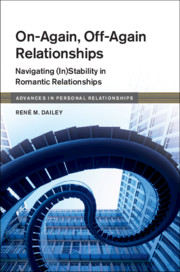Book contents
- On-Again, Off-Again Relationships
- Advances in Personal Relationships
- On-Again, Off-Again Relationships
- Copyright page
- Dedication
- Contents
- Figures
- Tables
- Acknowledgments
- Introduction
- 1 Description and Prevalence of On-Again/Off-Again Relationships
- 2 Differences from Non-Cyclical Relationships
- 3 Explaining On-Again/Off-Again Relationships
- 4 Types and Trajectories of On-Again/Off-Again Relationships
- 5 Breakups, Renewals, and In-Between
- 6 Conceptualizing (In)Stability
- 7 Practical Applications
- 8 Research Agenda
- Epilogue
- Appendix Description of Samples
- Notes
- References
- Index
6 - Conceptualizing (In)Stability
Published online by Cambridge University Press: 02 December 2019
- On-Again, Off-Again Relationships
- Advances in Personal Relationships
- On-Again, Off-Again Relationships
- Copyright page
- Dedication
- Contents
- Figures
- Tables
- Acknowledgments
- Introduction
- 1 Description and Prevalence of On-Again/Off-Again Relationships
- 2 Differences from Non-Cyclical Relationships
- 3 Explaining On-Again/Off-Again Relationships
- 4 Types and Trajectories of On-Again/Off-Again Relationships
- 5 Breakups, Renewals, and In-Between
- 6 Conceptualizing (In)Stability
- 7 Practical Applications
- 8 Research Agenda
- Epilogue
- Appendix Description of Samples
- Notes
- References
- Index
Summary
On-again/off-again relationships challenge the standard dichotomous definition of relationship stability (i.e., whether the relationship remains intact or dissolves). This chapter reviews the various conceptualizations of stability. Although on-off partners report less relationship stability when using subjective, one-time assessments (e.g., perceived stability, sense of security, or persistence in the relationship), a process-oriented assessment of stability is advocated in which relationship dynamics are measured over time. As argued by chaos theory, fluctuations over time could indicate a stable pattern. For example, research suggests certain fluctuations are associated with greater stability in on-off relationships. A process-oriented perspective could thus provide a more nuanced assessment of relationship stability for both on-off and non-cyclical relationships. Additional considerations for future research are also offered.
Keywords
Information
- Type
- Chapter
- Information
- On-Again, Off-Again RelationshipsNavigating (In)Stability in Romantic Relationships, pp. 113 - 137Publisher: Cambridge University PressPrint publication year: 2019
